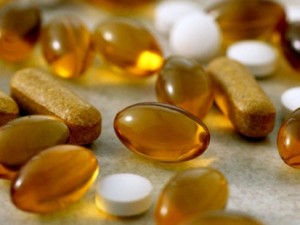 Vitamins are either fat soluble (stored in fat) or water soluble, which means they dissolve in water and must be replenished daily. The fat-soluble vitamins are A, D, E, and K, and the B complex and C vitamins are water soluble.
Vitamins are either fat soluble (stored in fat) or water soluble, which means they dissolve in water and must be replenished daily. The fat-soluble vitamins are A, D, E, and K, and the B complex and C vitamins are water soluble.
Vitamin B Complex
The B vitamins, also known as the B complex, are a group of eight vitamins that perform a variety of functions in the body. They help your body’s cell division and metabolism perform at peak efficiency, aid your immune system’s function, and promote healthy hair and skin.
The main sources of the B vitamins are whole grains, beans and legumes (including peanuts), animal products, yeast, and green or cruciferous vegetables. The vitamins are listed below along with their common names and prime sources:
B1: Also known as thiamine, B1 is found in whole grains, cruciferous vegetables, and animal products.
B2: Called riboflavin, this B vitamin is found in dairy products and green vegetables.
B3: Food sources high in niacin include meat, fish, and vegetables.
B5: Find pantothenic acid in animal products and green vegetables. Women may recognize this as an ingredient in beauty products.
B6: Also called pyridoxine, eat plenty of veggies and meat to get your B6.
B7: Biotin (also an ingredient you might recognize from beauty products) is found in animal products and peanuts.
B9: Folic acid is a vital nutrient for a healthy pregnancy and is found in grains and leafy vegetables.
B12: This vitamin, cyanocobalamin, presents challenges to vegetarians and vegans because it is found only in animal products.
Vitamin C
Known as ascorbic acid, vitamin C aids metabolism, fights infections and acts as an antioxidant. It also promotes healing, such as from breast reconstruction surgery, so we always suggest you ensure you’re getting enough. It’s found primarily in fruits and vegetables, as well as some meats such as liver. Sources high in vitamin C include peppers, berries, rose hips, and parsley.
The water-soluble vitamins are easily supplemented if the diet is deficient, though natural sources are always the best way to ingest them. These vitamins degrade when cooked, so raw foods are preferred. The important thing is that you’re receiving at least the reference daily intake (RDA) each day, as excess B and C vitamins are excreted in the urine.





